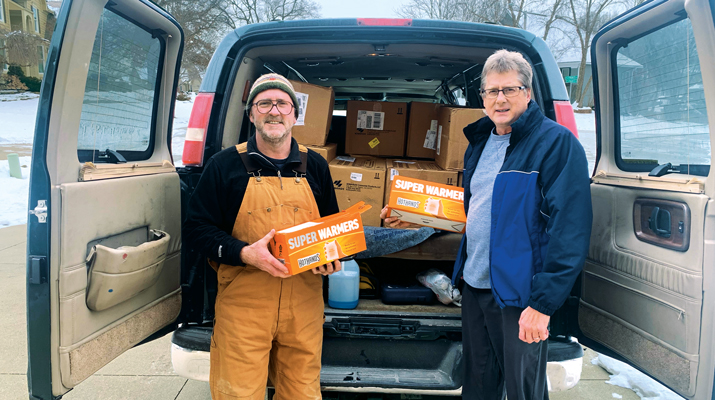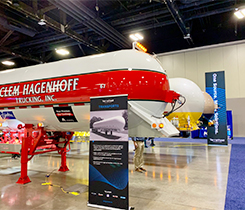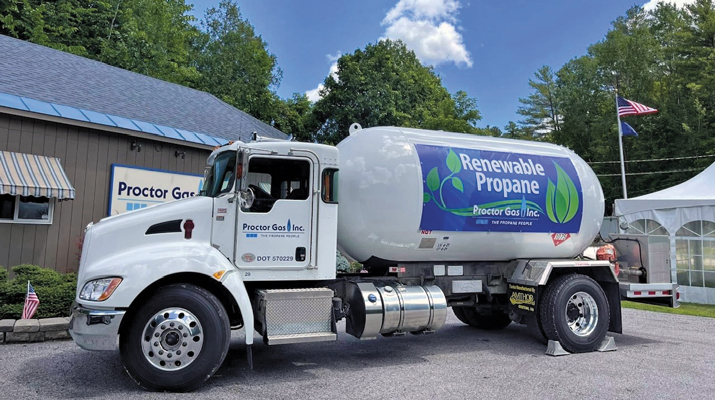Farmers reaping financial, performance yields with propane irrigation engines
Sowing the seeds of ditching diesel and making the switch to propane-powered irrigation engines is increasingly becoming a fertile field for propane marketers serving an agricultural clientele.
Farmers using the units are pleased with propane’s performance, and marketers are harvesting valuable summer load levels.
In addition, using propane frees farmers from the task of transporting the fuel while eliminating diesel thievery in isolated locations.
“Propane is really the future of irrigation,” says Gordon Cunningham, co-owner with his father Joe of Cunningham’s Gas in Helena, Ark. “In just a couple of years, I’ve gone from zero to servicing nearly 100 engines.”
Located deep in the Mississippi Delta, Cunningham’s clients are adopting propane to quench crops of corn, beans, rice, cotton, milo and wheat.
Established in the 1940s, the third-generation retailer is embracing the Propane Education & Research Council’s (PERC) Propane Farm Incentive Program, which lowers the initial cost of purchasing a new Environmental Protection Agency (EPA)-certified propane irrigation unit by offering participating growers a $400 incentive based on a per-liter engine displacement of up to 10.3 liters, for a total of $4,120.
As part of the research and demonstration project, eligible farmers report propane’s performance details to PERC for at least one season. Feedback yielded from the program aids in future product development.
Propane marketers typically refer growers to EPA-certified LP gas irrigation engine manufacturers, which include Power Solutions Inc. (PSI), Engine Distributors Inc. (EDI), Bucks Engines and Origin Engines, along with their respective regional sales channels. Industry retailers provide the lines, tanks and fuel.
Mark Leitman describes the agricultural sector’s response to the irrigation program as “awesome.” Some 230 farmers had submitted applications as of mid-June.
“Everything’s going well; we’re in a good spot right now,” says Leitman, PERC’s director of business development and marketing.
“The irrigation market is a great summer use for propane.”
The setup and installation logistics are similar to a residential account, and on average a single irrigation engine’s consumption can equal that of four homes, according to Leitman.
“The PERC program draws attention,” Cunningham says. “The benefit is that the customer benefits, and that benefits me.”
Cunningham’s quest to sell non-winter gallons led to his involvement with the program.
“I can’t sit on my rear or play golf in the summer months – I need to keep rolling,” Cunningham explains.
“The ones you really hit the jackpot with are rice farmers,” Cunningham says, citing average per-season, per-engine usage rates of 3,000 to 4,000 gallons.
Propane can ease concerns about electrical power outages; the cost and logistical challenges of getting natural gas into the field; and the environmental, price and performance issues associated with diesel engines.
“With propane, you just put it out in the field and let it rip,” Cunningham says. “You’re off the grid; it’s the perfect thing for somebody looking for an option. It’s clean burning and it has more Btus than natural gas.
“Diesel is totally irrelevant now,” he adds. “I tell them, ‘When your diesel [engine] goes out, get a propane one.’ Eventually the diesel engine does break down, and then I sell them a propane engine.”
Diesel engines also will have to meet new EPA Tier 4 emissions standards in 2014. The new standards will raise the cost per engine to about $30,000 – from about $20,000 for Tier 3 engines – and make it more difficult to find a mechanic knowledgeable enough to service the equipment, Cunningham says. Propane engines cost between $8,000 and $10,000 after rebate.
“A farm can save $1,500 to $3,000 a season [using propane engines], depending on the crop and the amount of usage, but one thing is for certain: The farm is going to save money on the engine and on consumption, and I’m going to sell gas,” Cunningham adds.
Smoother and cleaner
Cunningham customer Jackie Swindle grows rice, corn, milo (a type of grain), wheat and soybeans on his 8,500-acre farm, Swindle Farms, in Lambrook, Ark. Currently running 33 diesel and nine propane-powered irrigation sites, the cost and fuel efficiency of LP gas have him sold on propane’s pluses.
“We love them; they’ve worked out great,” Swindle says.
“You get the same results as with diesel engines and you save money,” he adds. “They set it all up; it’s a turnkey system. All we did was start it up – it was ready to go.”
Predating the PERC initiative, the Carreon Vineyards in Bakersfield, Calif., has been using propane for its irrigation for 12 years. Rene Carreon reports that he readily recommends the units to other growers.
“They’re running a lot smoother and cleaner than diesel,” he says. “They’re efficient, and they do what we want and what we need.”
The farm’s LP gas dealer, Delta Liquid Energy of Pasa Robles, Calif., ensures that the tanks are kept full.
“Irrigation engines are also used in the winter for frost protection,” says Robert Jacobs, Delta’s vice president.
When a cold-weather warning is issued, the sprinkler systems are activated to mist the crops. It encapsulates the fruit and freezes, providing a layer of insulation, he explains.
“I’ve aligned ourselves with people and companies who sell the engines,” Jacobs says. “We install the tank and gas line. We go out to a farmer and talk about propane over electricity and diesel, and the acceptance is good.”
“The economics between propane and diesel are wonderful right now,” he adds. “They’re using the propane in the spring and summer when propane prices are lowest and diesel prices are typically the highest.”
Assuming the cost of diesel is $3.50 per gallon, a diesel irrigation engine consumes 10 gallons per hour, while a propane model is able to burn 15 gallons at $1.50 per gallon.
“Propane becomes a better deal,” says Jacobs, who adds that he’s never had noise or performance complaints.
“Fifteen gallons of propane is a lot cheaper than 10 gallons of diesel, and you have containment issues with diesel,” he adds.
Diesel engines are more expensive because of tough environmental regulations, and if a farmer lets a field go fallow for a season the diesel fuel can deteriorate within the tank.
“You have the freedom to irrigate whenever you want,” Jacobs says, “and you can throttle it up or down to take care of your needs.”
Electrically powered irrigation engines are fraught with costly peril because of the risks posed by brownouts and blackouts that can quickly destroy an entire yield.
“They’re beholden to the utility,” Jacobs says.
Earning trust
According to Mike Vanstory at Wilder LP Gas Co. Inc. in Mason, Tenn., the biggest stumbling block he faces in western Tennessee is that electricity is so convenient.
Among the growers in his area, six of 10 irrigation engines are electrically powered, due in part to low rates. Diesel also remains popular because farmers are comfortable with their diesel pickup trucks, tractors and other equipment. Also, unfamiliarity with propane scares off some growers, Vanstory says.
Nonetheless, he is pleased that he’s already sold four propane engines within the year that his business has been involved with the PERC program.
According to Vanstory, key selling points are the program’s per-liter financial initiative and Wilder’s earned trust as a local propane provider.
“They have to believe in who they’re buying it from,” Vanstory says.
Another plus is that adapting to propane irrigation engines frees the farmer from the task of routinely transporting diesel fuel from a central location to a remote watering site.
“They’re not having to do it because we’re already hauling propane down the road,” Vanstory says.
Propane marketer Todd Lawrence, general manager of Farmers Cooperative in Live Oak, Fla., says his customers are especially pleased with the improvements rendered by the industry’s involvement in perfecting the performance of today’s engines, recalling when units 25 to 35 years ago were widely considered inefficient and loud.
“They’re now a lot quieter and more efficient,” Lawrence says. “They’re starting to take off; we have five in the field right now. There’s a bright future in our area because of the increase in irrigation.”
Taking advantage of healthier crop prices, many farmers are doubling their acreage.
“It’s a lot of work [making the rounds of sales pitches], but once we get some of these out there they’ll sell themselves,” Lawrence says.
Utilizing remote monitoring to ensure an uninterrupted supply, Lawrence says his business is filling tanks every 30 days.
“The performance has been just as good with the propane motors as it was with the diesel motors,” adds Ted Henderson, a Farmers Cooperative customer who owns Shenandoah Dairy in Live Oak.
The operation encompasses 2,000 acres of irrigated fields serving 3,250 cows. So far, Henderson has purchased three LP gas engines while recommending the technology to two colleagues, with both of them subsequently opting to give propane a try in their fields. That development has Lawrence milking the benefits.
“It’s nice to have some cash flow during the spring and summer months,” he says.
Pictured above: Nathan Wirsen of Rawhide Chemoil Inc.

















Need price on lp enges